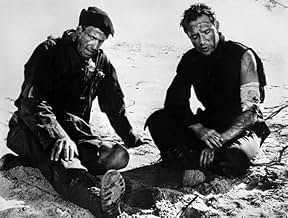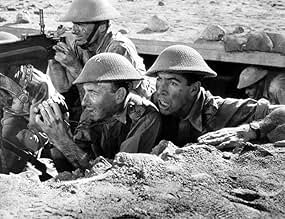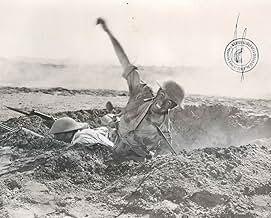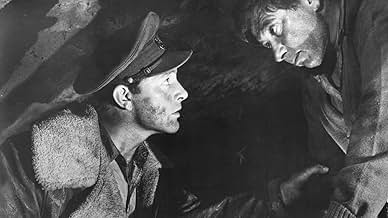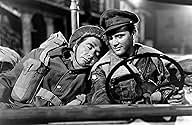Adicionar um enredo no seu idiomaRichard Burton plays a Scottish Army officer put in charge of a disparate band of ANZAC troops on the perimeter of Tobruk with the German Army doing their best to dislodge them.Richard Burton plays a Scottish Army officer put in charge of a disparate band of ANZAC troops on the perimeter of Tobruk with the German Army doing their best to dislodge them.Richard Burton plays a Scottish Army officer put in charge of a disparate band of ANZAC troops on the perimeter of Tobruk with the German Army doing their best to dislodge them.
- Indicado a 1 Oscar
- 1 vitória e 1 indicação no total
- Lt. Harry Carstairs
- (as Charles Tingwell)
- English Officer
- (não creditado)
- Corporal
- (não creditado)
- British Officer
- (não creditado)
- Sergeant
- (não creditado)
- German Lieutenant
- (não creditado)
- German Gunner
- (não creditado)
- German Radio Man
- (não creditado)
- German Orderly
- (não creditado)
- Colonel
- (não creditado)
Avaliações em destaque
Title (Brazil): "Ratos do Deserto" ("Desert Rats")
One of the most realistic and best of the fifties war movies with excellent direction by Robert Wise
This reconstruction of a phase in the battle of Tobruk(deeds also filmed by Arthur Hiller in ¨Tobruk¨ with Rock Hudson) is correctly based on true events, though excessive importance for the Aussies. The actual deeds are based on series of engagements between British and Axis forces over Libyan port. Occupied by Italy 1911, Tobruk was taken by Britain in Operation Battleaxe 1941.It was captured by Field Marshal Erwin Rommel June 1942 after the retreat of the main British force to Egypt, and this precipitated General Sir Claude Auchinleck's replacement by General Bernard Montgomery as British commander. Montgomery recovered it after the second of Battle of El Alamein and it remained in British hands for the rest of the war.
They have always had a reputation as an informal people and it's with a bit of surprise that spit and polish Scots officer Richard Burton is put in charge of a batallion in a forward area of the defense perimeter surrounding Tobruk. The men and Burton don't take to each other too readily, but gradually the troops grow to respect Burton as a courageous fighting man.
Burton as it happens gets a bit of assistance from an unexpected quarter. His old schoolmaster Robert Newton had immigrated to Australia and enlisted in their army at the start of World War II. When not focusing on the battle sequences, The Desert Rats is about the relationship between Burton and Newton. All the rules about army discipline and separation of officers and enlisted men go by the boards here. Burton who's been under a strain like everyone else under siege at Tobruk gets a safety valve in Newton. An old friend from the past, a father figure if you will, gives Burton someone he can confide his innermost thoughts and fears to.
Sad to say the alcoholic Mr. Newton gives a refrained and dignified performance as a middle aged alcoholic schoolmaster. A role he could understand all too well from real life. He complements Burton's performance every step of the way in this film.
Look for some good performances from Australian actors Charles Tingwell and Chips Rafferty. Though this is a film about the Allied forces at Tobruk in 1941 and no Americans were officially fighting, this is an American production. So these two guys made their American cinema debuts. Tingwell never made another American film, but Rafferty came back a few times and his presence makes every film he's in just a bit better.
You might recognize Michael Rennie's voice doing the offscreen narration for The Desert Rats. The Desert Rats is a timeless wartime classic about the strain of command at every level of the Armed Services.
The most fascinating part of this film is to watch both the marvelous Robert Newton and the under-rated James Mason give Richard Burton acting lessons.
Burton tends to chew the scenery when he snarls, "Good-morning," as though he were the youngest in a large family, doing anything for attention.
Newton counters Burton's unnecessary histrionics with a beautifully modulated realization of-himself in disguise as Prof. Bartlett, Burton's old instructor. I think this is the most honest look at the REAL Newton on film. The rueful man who clearly understands his inability to stay sober, but still has enough control to see his own and everyone else's situation clearly. He is the kind, timorous, brilliant failure who, in one burst of glory, up-stages his more successful juniors. Newton delivers a truly magical performance.
James Mason also delivers a balanced and multi-layered Rommel. Of course he practiced playing this brilliant German General in the better-known film, The Desert Fox.
Burton comes across as pure ham in The Desert Rats, but there IS one scene he has where he is honest and effective. He explains to Bartlett that the picture of the young woman in his wallet is his wife. The picture actually IS Burton's wife, pre-Elizabeth Taylor.
Otherwise, although Burton is billed as the star, the film belongs to Newton and Mason. See it for the pleasure of their company.
Você sabia?
- CuriosidadesThe film was banned in Egypt, as the British were still occupying the Suez Canal and the Sudan.
- Erros de gravaçãoDuring the raid on the German camp there is a sign on a building reading "Hauptquartiers". Although the English word "Headquarters" might suggest a plural s, in German there doesn't exist such a form. The correct word would be "Hauptquartier" and the plural "Hauptquartiere"
- Citações
Tom Bartlett: You don't know much about real fear, Tammy. Maybe it comes with age or the bottle. You don't know what it is to be a coward... really a coward. To know it, yet to hope one day something will happen to prove that you're not, yet half the time not really believing that either.
- Cenas durante ou pós-créditosOpening credits prologue: 1941 LIBYAN DESERT NORTH AFRICA
- ConexõesEdited into All This and World War II (1976)
- Trilhas sonorasWaltzing Matilda
(1895) (uncredited)
Original music by Christina Macpherson (1895)
(Based on the Scottish tune "Craigielee", music by James Barr, with words by Robert Tannahill)
Revised music by Marie Cowan (1903)
Lyrics by A.B. 'Banjo' Paterson (1895)
Played during the opening credits and often in the score
Principais escolhas
- How long is The Desert Rats?Fornecido pela Alexa
Detalhes
Bilheteria
- Orçamento
- US$ 1.320.000 (estimativa)
- Tempo de duração
- 1 h 28 min(88 min)
- Cor
- Proporção
- 1.37 : 1


